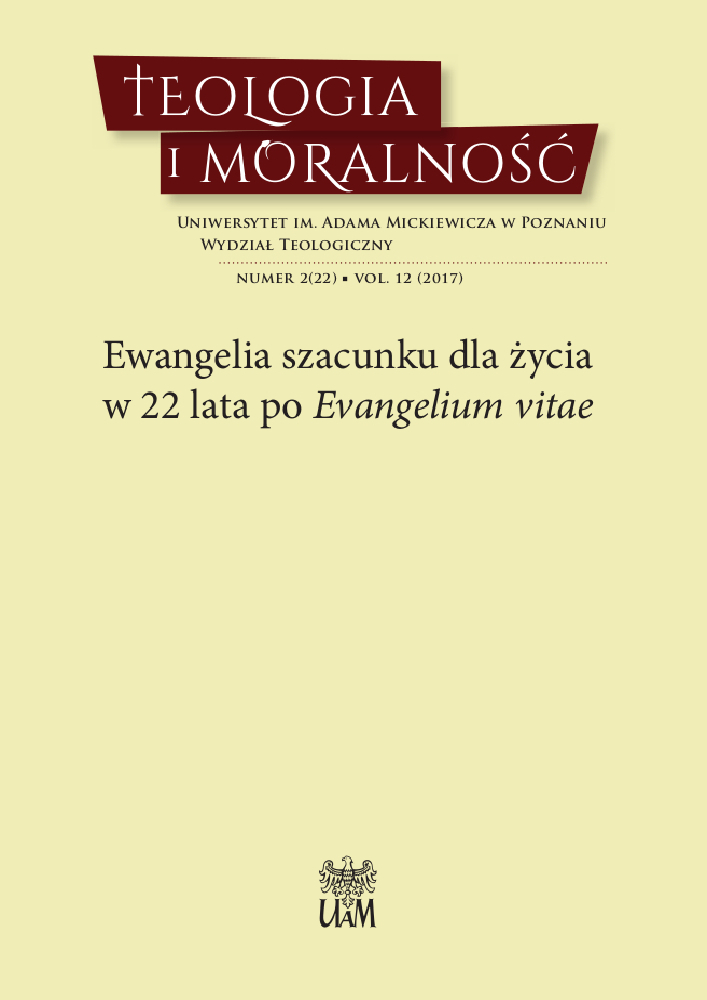Abstract
In the light of the Encyclical Evangelium Vitae (point 73), abortion is a crime no human law can accept. As the direct murder of innocent beings (Evangelium Vitae point 72), abortion is not limited to the relationship between God and the sinner. With far reaching, dramatic social eff ects, it is always an external act demanding a proper response from the state. John Paul II regretted that, in collective consciousness, the abortive assassinations of life lose the character of ‟crime” and paradoxically gainthe status of ‟law,” to the extent that they are demanded to recognize their full legitimacy by the state and then perform them free of charge by health workforce (Evangelium Vitae point 11). Although abortion is often a dramatic and painful experience for the mother, as it may be entangled in the desire to save other important values, John Paul II emphasized that all these and similar arguments, however serious and dramatic, can never justify intentional deprivation of an innocent life. (Evangelium Vitae,point 58). Therefore, the Congregation for the Doctrine of the Faith emphasizes that in case of terminating a pregnancy, resignation from punishing seems to mean that the legislature no longer considers abortion a crime against human life, since murder is always punishable. The implementation of these obvious general principles takes place in the legal order of about 150 countries of the world, including the criminal law
of the Vatican City State, which (regardless of the excommunication latae sententiae in spiritual order) provides for the criminal responsibility of every deliberate perpetrator of abortion killing a child. The criminal liability of the mother for this act has not been abolished also in the great penal law reforms carried out for the pontifi cates of Benedict XVI and Francis. Although the legislation of most other states treats mothers
equally with other abortion accomplices, the authors of the ‟Stop Abortion” project have envisaged the full possibility of the court canceling the penalty against the mother, without any condition being imposed by the court, i.e. according to the project notimposing the penalty could take.
References
Declaratio de abortu procurato, 18 Novembris 1974, AAS 66 (1974), ss. 730-747.
Jan Paweł II, Evangelium Vitae Ojca Świętego Jana Pawła II do biskupów, do kapłanów i diakonów, do zakonników i zakonnic, do katolików świeckich oraz do wszystkich ludzi dobrej woli o wartości i nienaruszalności życia ludzkiego z dnia 25 marca 1995 r., „Acta Apostolicae Sedis” 87 (1995), ss. 401-522.
Jan Paweł II, Veritatis splendor, do wszystkich biskupów Kościoła katolickiego o niektórych podstawowych problemach nauczania moralnego Kościoła „Acta Apostolicae Sedis” 85 (1993), ss. 1134-1228.
Katechizm Kościoła Katolickiego, Pallottinum: 2009.
Komunikat z 372. Zebrania Plenarnego Konferencji Episkopatu Polski z dnia 14-16 kwietnia 2016 r. http://episkopat.pl/komunikat-z-372-zebrania-plenarnego-konferencji-episkopatu-polski/ [dostęp: 22.12.2017].
Komunikat z 374. Zebrania Plenarnego Konferencji Episkopatu Polski z dnia 4-5 października 2016 r. http://episkopat.pl/komunikat-z-374-zebrania-plenarnego-konferencji-episkopatu-polski/ [dostęp: 22.12.2017].
„L’Osservatore Romano”, 11 lipca 2009 r.
Zych T., Kwaśniewski J., Pełna ochrona prawna dziecka poczętego - aspekt prawnokarny, http://www.ordoiuris.pl/ochrona-zycia/pelna-ochrona-prawna-dziecka-poczetego-aspekt-prawnokarny [dostęp: 23.12.2017].
License

This work is licensed under a Creative Commons Attribution-NoDerivatives 4.0 International License.
